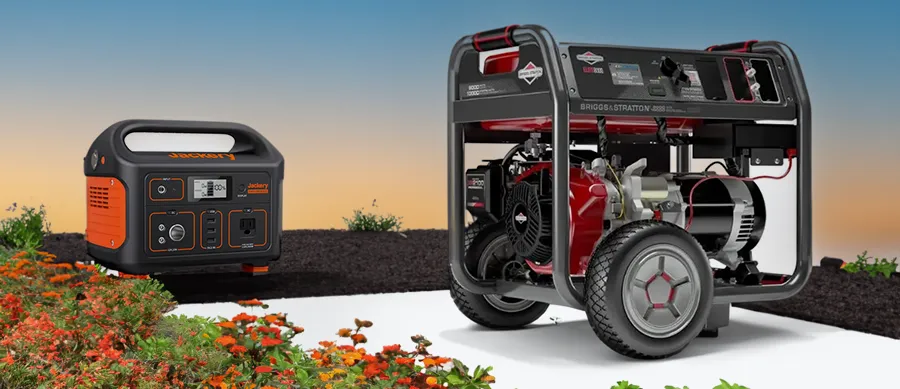
Written by Chris on September 4, 2023
Product: BlogPortable Power Stations
Portable Power Stations and Gas-Powered Generators
Updated on: 29 November 2023
Making the Right Choice for Your Power Needs
When it comes to providing reliable backup power during outages or enabling off-grid adventures, two popular options come to mind: portable power stations and the more traditional gas-powered generators some of which can also operate with propane. Both types have their pluses and minuses, making your choice between them being a matter of what you want one for and your preferences. In this article, we will examine the benefits of each in the hope that this will guide you towards making an informed decision based on your particular circumstances.
Portable Power Stations: The Modern Power Solution
Let’s start by looking at the benefits of a portable power station.
Clean and Quiet Operation
Portable power stations are recognized as being comparatively environmentally friendly and, unlike their gas-powered counterparts, they produce zero emissions. They are also virtually silent, making them ideal for indoor use and all sorts of light-duty outdoor activities such as hiking, camping and tailgating.
Compact and Lightweight
Another outstanding advantage of portable power stations is how portable they are. They come in various sizes but in general are relatively compact and lightweight. They are really designed to be portable by being equipped with comfortable handles to make them easy to transport and set up wherever you need a limited source of power.
Versatile Power Outputs
Portable power stations are fitted with various power outlets, including AC sockets, USB ports, and DC ports. This versatility allows you to charge and run a wide range of devices, from smartphones and laptops to power tools and medical equipment. Many of the models we show on this website support solar panel input for sustainable and virtually limitless off-grid power generation (subject to weather conditions).
Low Maintenance
Compared to gas-powered generators, portable power stations require minimal maintenance. There’s no need to worry about fuel storage, oil changes, or engine maintenance. Simply charge the unit when needed, and it’s ready to provide power.
Safety and Reliability
Whereas both types have their dangers, portable power stations are generally considered safer than gas-powered generators. They don’t emit fumes harmful to health and the environment (carbon monoxide). And because the lithium batteries can in certain circumstances become unstable, the units are fitted with safety features like overload protection and temperature control.
Gas-Powered Generators: Traditional Powerhouses
While portable power station are clear winners in certain respects they fall short in a number of specific areas some of which might be essential needs in your particular circumstances. These include:
Much Higher Power Output
Gas and dual fuel generators, including inverters, cannot be matched for their ability to deliver substantial higher power outputs. This makes them ideally suitable for running larger appliances, powering entire households during outages, or supporting construction sites and outdoor events with demanding power needs.
Extended Runtime
These generators can run for much longer periods though in the case of gas extra care needs to be taken for safe storage. Being able to operate for long periods is a must for those who live in areas that experience unpredictable and prolonged power outages due to weather or an ageing infrastructure. Though a portable power station’s battery can run for varying amounts of time it may not be able to cope in a sustained way with the demands of an emergency.
Quick and Easy Refueling
These generators can be refueled quickly with gasoline or propane which is readily available at gas stations or in portable canisters. This can help ensure uninterrupted power supply during emergencies, though supplies may be more difficult to come by in such scenarios in which case safe storage facilities must be considered.
Robust and Durable
Though they are not designed for long-term continuous operation they are often built with robust materials, making them more durable for heavy-duty use over the long term. And with proper protection (for example, covers) and proper maintenance they can withstand harsh weather conditions.
Conclusion: Making the Right Choice
The choice between a portable power station and a gas-powered generator ultimately depends on your specific needs and priorities. Portable power stations offer clean and quiet operation, ease of use and versatility, making them a preferred choice for many and especially for those living in apartments. They are particularly suitable for small to medium power needs and environmentally conscious users.
On the other hand, gas-powered generators excel in providing high power output and extended runtime, making them ideal for large-scale power requirements and situations where uninterrupted power is critical.
Before making your decision, carefully assess your power needs, budget, environmental considerations, and the level of maintenance you are willing to undertake. Whichever option you choose, both portable power stations and gas-powered generators can ensure that you have reliable backup power when you need it most.